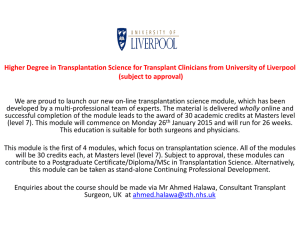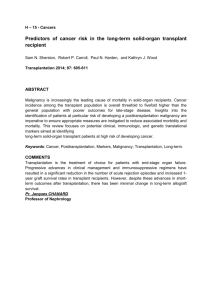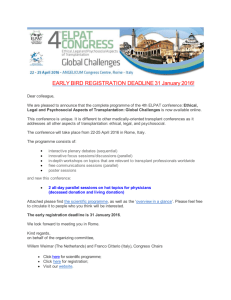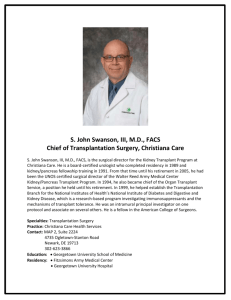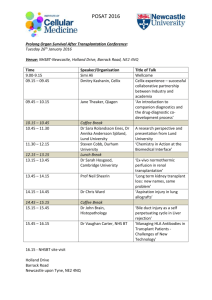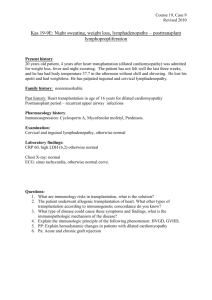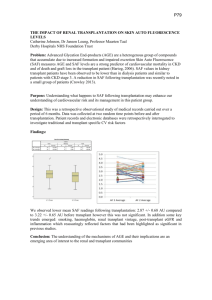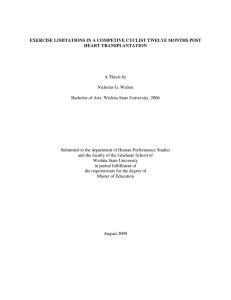Goals and Objectives Transplant
advertisement
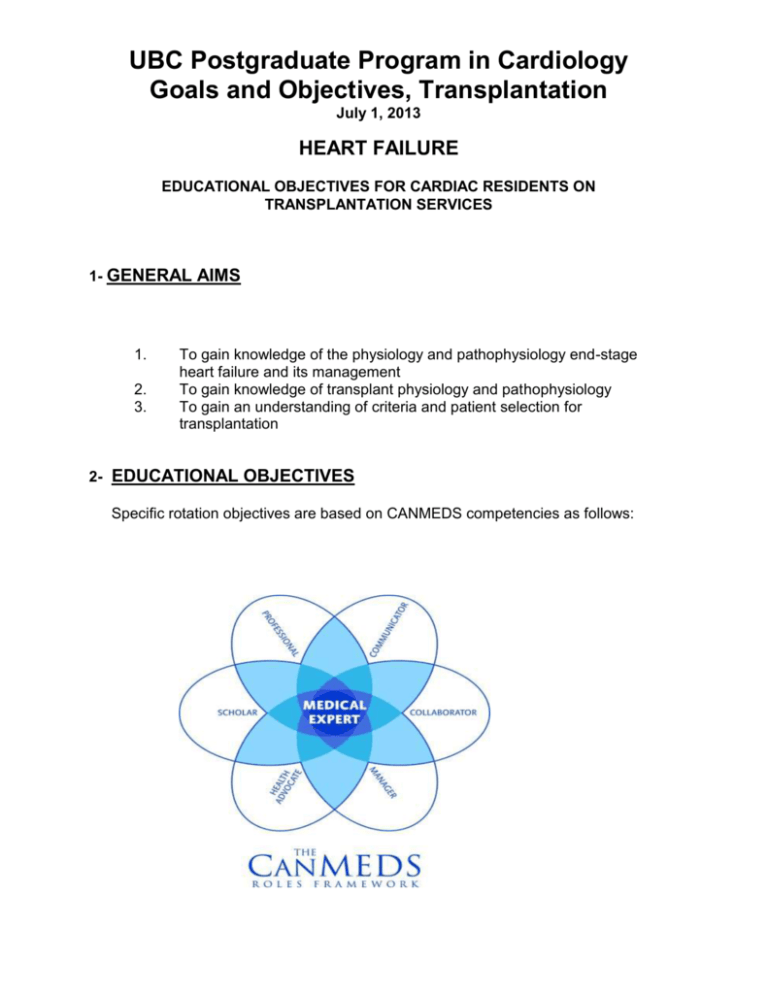
UBC Postgraduate Program in Cardiology Goals and Objectives, Transplantation July 1, 2013 HEART FAILURE EDUCATIONAL OBJECTIVES FOR CARDIAC RESIDENTS ON TRANSPLANTATION SERVICES 1- GENERAL AIMS 1. 2. 3. To gain knowledge of the physiology and pathophysiology end-stage heart failure and its management To gain knowledge of transplant physiology and pathophysiology To gain an understanding of criteria and patient selection for transplantation 2- EDUCATIONAL OBJECTIVES Specific rotation objectives are based on CANMEDS competencies as follows: UBC Postgraduate Program in Cardiology Goals and Objectives, Transplantation July 1, 2013 (I)- Medical Expert / Clinical Decision maker A. Cognitive Knowledge 1. 2. 3. 4. 5. 6. 7. 8. 9. 10. 11. An understanding of the relative role of transplantation in the mechanical and surgical management of end-stage heart failure Knowledge of clinical pharmacology of transplant drugs Working knowledge of underlying disorders amenable to transplantation and indications for assessment Knowledge of pre-heart transplant recipient assessment procedures Knowledge of the technical procedures of organ retrieval, recipient explant and implantation Knowledge of the Pathophysiology of brain death and donor assessment Basic knowledge of principles of immunosuppression Basic knowledge of post-operative care, complications and their management Basic knowledge of long-term following and results of cardiac transplantation An understanding of the relative role of mechanical circulatory assist in management of end-stage heart failure and cardiogenic shock Basic knowledge of patient and device selection B. Clinical Skills 1. 2. 3. 4. 5. 6. 7. 8. Take a relevant history Perform an acceptable physical exam concentrating on the relevant areas Arrive at an appropriate differential diagnosis Order appropriate laboratory, radiological and other diagnostic procedures demonstrating knowledge in the interpretation of these investigations, especially in the chest X-ray, electrocardiogram, CT and MRI scan and echocardiography Arrive at an acceptable plan of management, demonstrating knowledge in the operative and the non-operative management of the disease process Asses patients in the ambulatory setting and be able to perform the initial interview and assessment of the patient who has been referred for cardiac surgery Manage the patient throughout the hospital stay, including management in an intensive care setting, demonstrating knowledge of and an ability to anticipate, recognize, and manage potential complications of the disease processes and operative procedures Provide a plan for patient follow up. UBC Postgraduate Program in Cardiology Goals and Objectives, Transplantation July 1, 2013 C. Technical Skills 1. Management of all aspects of the cardiac surgical patient preoperatively and postoperatively including critical care in the intensive care setting (II) - Communicator 1. Establish effective communication with patients and families 2. Establish effective communication with members of the health care team verbally and through written record 3. Obtain informed consent for medical procedures and treatments 4. Bedside presentation of patient 5. Communicate with referring / family physician 6. Presentation and discussion at teaching and patient care rounds (III) – Collaborator 1. Work effectively with the healthcare team 2. Demonstrate appropriate use of consulting services 3. Recognize and respect roles of team members 4. Act as member of multidisciplinary team in the heart failure and transplant (IV) – Manager 1. Understand the principles of administration and management 2. Know the duties of the department head 3. Effective and ethical utilization of health care resources 4. Effective time management 5. Supervision / implementation of patient care decisions 6. Appropriate use of information technology 7. Recognize impaired performance in self + in professional colleagues 8. Understand the issues in organizing a scientific meetings 9. Learn to delegate responsibilities in a fair and non-threatening manner 10. Recognize and manage problems with junior staff in a non-threatening and constructive manner (V) – Health Advocate 1. Understand health determinants (role of social and economic factors in disease) UBC Postgraduate Program in Cardiology Goals and Objectives, Transplantation July 1, 2013 2. Educate and consults families regarding condition and risk factors 3. Able to consult prevention strategies 4. Appreciate the ethical aspects of cardiac transplantation 5. Appreciate the difficult and stressful situations associated with the environment of critical illness 6. Learn to identify and minimize the stress placed upon the patient, the relatives and hospital staff during heart failure admissions (VI) – Scholar 1. Establish a comprehensive self- directive learning and educational strategy 2. Develop an appreciation of the role as critical appraisal in the assessment of career development 3. Develop an understanding of evidence based medication for heart failure 5. Participate in the process of quality improvement exercises 6. Understand the requirements of the Royal College for maintenance of certification (VII) – Professional A. Responsibility 1. Demonstrate highest qualities in personal and interpersonal professional behavior (integrity, honesty and composer) 2. Demonstrate excellence and completion of tasks and punctuality B. Self assessment ability 1. Recognize when to ask for assistance from more experienced colleagues 2. Be aware of own limitations C. Values & Ethics 1. Recognize and deals with ethical issues regarding transplant and device therapy 2. Respect personal culture and gender issues regarding medication compliance, transplant candidacy and device candidacy This document was prepared and approved by the Medical Director of Cardiac Transplantation at the University of British Columbia. UBC Postgraduate Program in Cardiology Goals and Objectives, Transplantation July 1, 2013 Reviewed: June 2013
